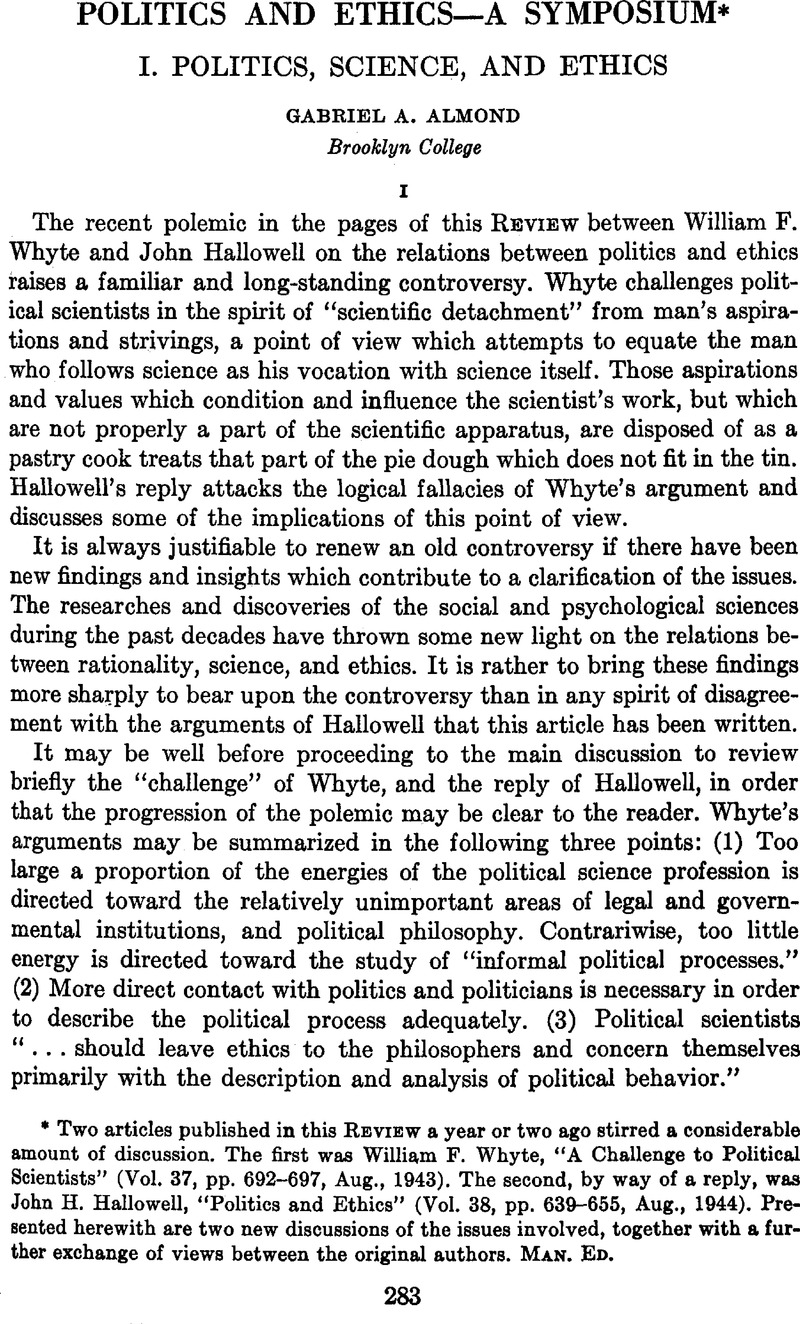No CrossRef data available.
Article contents
II. Political Processes and Judgments of Value
Published online by Cambridge University Press: 02 September 2013
Abstract

- Type
- Politics and Ethics—A Symposium
- Information
- Copyright
- Copyright © American Political Science Association 1946
References
1 For discussions of laissez-faire in the intellectual realm, see Lynd, Robert, Knowledge for What (Princeton, 1937)Google Scholar; Riesman, David Jr., “Civil Liberties in a Period of Transition,” Public Policy Yearbook (Cambridge, Mass., 1942), 32–98Google Scholar; and my “Civil Liberties in a Twentieth Century World,” in Chafee, Z. Jr., et al., Censorship in Time of Crisis (out of print), Civil Liberties Committee of Massachusetts, 1941.Google Scholar
2 Lundberg, George A., Social Research (New York, 1942), pp. 32–33.Google Scholar
3 Kenneth Burke has indicated the process by which the “pure” scientist needlessly puts himself in the unstrategic position of opposing morality in Attitudes Towards History (New York, 1937), “Stealing Back and Forth of Symbols,” II, 229–230. Lewis, Sinclair, in Arrowsmith, Chaps. 21–25Google Scholar, shows his hero as unethical, because he permits himself to try to save lives rather than to develop a controlled experiment.
4 Cottrell, L. S. Jr., and Gallagher, Ruth, have summarized much relevant literature, in Developments in Social Psychology, 1930–1940 (Beacon, New York).CrossRefGoogle Scholar
5 Richardson, Lewis F., “Generalized Foreign Politics,” British Journal of Psychology, Suppl. Monog. XXIII (Cambridge, Eng., 1939).Google Scholar
6 See my “Implications of Supranational Federation,” American Sociological Review, Vol. 7, pp. 400–406 (1942).
7 One reason why I failed may be worth noting. I allowed myself to be maneuvered into a position where I appeared (like Whyte) to be defending “pure,” that is esoteric, research for its own sake. Were I ever to encounter such a situation again, I would concentrate far more than I did on explaining what “basic” research is and why what I propose is basic.
8 See Waples, Douglas, Berelson, Bernard, and Bradshaw, Franklyn, What Reading Does to People (Chicago, 1940)Google Scholar, which provides a framework for the analysis of such questions.
9 Maritain says that what a person with a rough idea of moral science may consider “contrary to virtue and morality may sometimes be the authentically moral behavior of a just man engaged in the complexities of human life and of true ethics.” Quoted from his “End of Machiavellianism,” Review of Politics, Jan., 1942, p. 5, by McCoy, Charles, in “The Place of Machiavelli in the History of Political Thought,” in this Review, Vol. 37, p. 634, note (1943).Google Scholar Also, on this point see my “Be Not the First” (a discussion of the theory of compromise), Journal of Liberal Religion, Vol. 6, pp. 27–37 (Autumn, 1944).





Comments
No Comments have been published for this article.